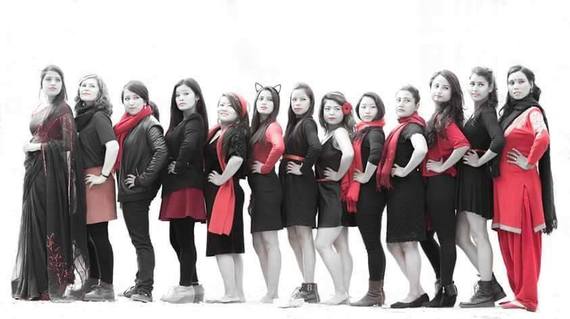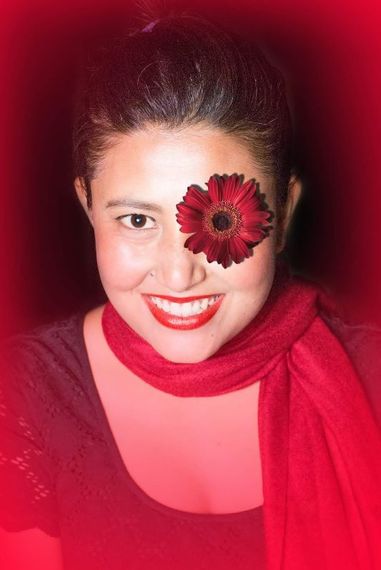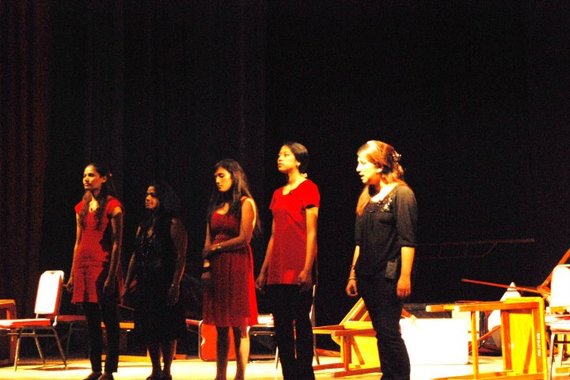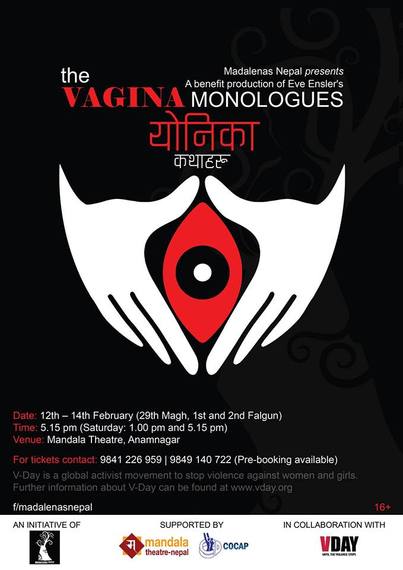With Valentine's Day around the corner, this is the time when Vagina Monologues performances take off around the world. Earlier this year, I came across an article on your site that featured Sondos Shabayek. Spurred on by the Arab spring, this gutsy journalist from Egypt created shockwaves when she turned away from journalism to indulge her passion for theatre in 2011 during the heady days of the Egyptian revolution and the now-famous protests in Tahrir Square.
Shabayek staged a series of monologues about the need for democracy and freedom; and then decided this had to be enacted on stage by a troupe that would bring new insights about the protest movement to the Egyptian people. She resigned from writing for a well-known daily and took on the art of theatre to bring the stories of the early days of the revolution, and of courage followed swiftly by violent crackdown, to the people.
Fuelled by this adrenalin, she decided to transform this power of storytelling to open up a conversation about sexual harassment, domestic violence and masturbation - all of which are still largely taboo in Egypt's conservative society. BuSSy, from a translation of the Arabic word for "look," is a play on a slang word used to refer to vaginas. It became a storytelling platform and Shabayek has courageously proceeded by taking "BuSSy" performances to venues across Egypt.
Fast forward to spring 2016 and a group of young women in Kathmandu, Nepal, who are staging their interpretation of Vagina Monologues. Calling themselves the Magdalenas Nepal, after a similar project that sprang up in Wales in the 1980s, and that has gained ground in Europe and Latin America, they drew on the theatre training of a few women who wanted to just come together and do a workshop or two, by meeting once a week. According to its professed aims, the Magdalena Project aims to create opportunities for women to explore new approaches to theatre-making that reflect, more profoundly, their own experiences and political priorities.
As the group in Kathmandu shared experiences about intimacy, sex and relationships, they delved into their fears and acceptance of how silence was the norm. They realized they had to take this journey further and talk about the fundamentally gender-insensitive and often misogynistic treatment so many of them and their peers had been subjected to. A lab session turned into a few weeks of workshops focusing on gender and sexual identity, and before they knew it, this catharsis was building towards a public and focused discussion of their questions, introspection and fulminations about sexuality, physical relationships, marriage, gender stereotyping and role-playing.
The road has been less than obstacle-free and the women involved have had to tolerate barbs and predictable pushback from many quarters. From whispers about "What do these girls do when they meet in the dark," to derogatory talk about men having their own problems, and caustic comments about a group of urban divas imbibing Western concepts, they have stoked fierce resentment that this kind of conversation is alien to conservative Nepali society.
The Magdalenas Nepal are undeterred. They have found tremendous solace in being able to voice thoughts about taboo subjects that face married and single women, women who may have had college education but are still expected to conform to social mores that they are struggling to come to terms with. Then there are those who have worked in the world of film and theatre inhabiting roles where they are typecast and unable to portray strong gender roles.

"Breaking the conventional smile. Daring to, actually. Because The Vagina Monologues 2016 taught me that I can, and it doesn't matter."Akanchha Karki Credit: Barbara Lionart
Many of the leading men involved with Mandala Theater in Kathmandu have been a huge source of inspiration by supporting this initiative and even facilitating some of the public orientation sessions. Sometimes it has been a huge boost to hear from iconic male and female figures, and from parents of the actors, that they are waiting to see this brought to stage, and possibly taken beyond Kathmandu.
The exchanges themselves have been transformative, triggering soul-searching and opening up the opportunity to confront truths that they would not have ordinarily have dreamed of in the past. While many of the women performing fully expect that they will have to go on with life as usual, many others are clear that "getting married as the pinnacle of social achievement" is not the trajectory they will embrace. They have chosen to call it Yonika Kathaharu, which is a colloquial translation of the English title.
When some of the now-famous episodes of The Moaner or The Coochie Snorcher were first performed by Eve Ensler in the United States, she and her actors were breaking barriers - Eve herself was terrified. But she brought in famous women to join some of the performances. When I watched it many years ago in New York City, former Mayor Rudolf Giuliani's wife was on stage along with singer Alanis Morissette - others who took part were actors Glenn Close, Susan Sarandon and Whoopi Goldberg. And the overwhelming response in the audience was humor, solidarity and resonance.
When I performed in Vagina Monologues in Kathmandu some six years ago, it was an intense experience that probably left all who acted, and many who watched, profoundly changed. Under the direction of male director Eelum Dixit, who was determined to stage this despite a previous attempt that did not go down well, we performed "Anyone of Us: Words from Prison" which chronicled excerpts from the lives of women incarcerated in prison due to their homicidal acts responding to domestic and gender violence.
I will never forget some of the women who came up to us after the first performance with tears in their eyes. And especially my six-year-old daughter who had difficulty separating truth from art, and asked me if I really had lost my third child.
Let's not pretend that staging this kind of theatre is a one-off and just allows us to go to the theatre for the evening and be entertained. This is theatre as expression of social injustice and introspection. This is Theatre of the Oppressed which gives voice to those who do not dare to ask questions. It is for men and women to reflect on why things are the way they are. It is for young adults to step into that space where they are beginning to understand sexuality, and to learn what is permissible and what is not.
So whether it's in Nepal or Egypt or Argentina, or Nigeria or China, the Vagina Monologues is a seismic movement, perhaps a revolution. Like all social movements, it challenges taboos and pushes boundaries, and makes many who uphold the status quo exceedingly uncomfortable. If it wasn't threatening or didn't create a stir, I would be worried.



